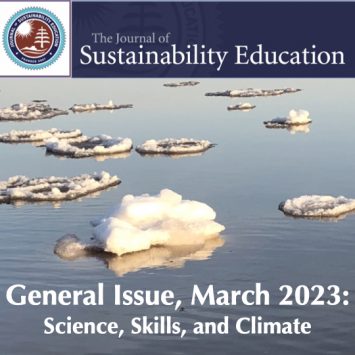General Issue March 2023: Science, Skills, and Climate
From the Editor:
This issue has been a labor of love through a winter of extreme weather and after a year of near constant cyber attacks (the free exchange of sustainability ideas is apparently quite threatening to some). I am struck by the number of ways that the authors in this issue identify key leverage points in our ability to change our current, disastrous direction as a species — from shifting our root metaphors in the context of climate change, to addressing the needs of elementary teachers to better understand and teach climate change and adaptation.
Over my years of editing this journal, I have noticed the academic discourse around climate change and other global trends evolving into one of embodiment, place-rootedness, and clear positionality while continuing to celebrate rigorous research processes. In addition to being a researcher and teacher, I am an organic farmer faced daily with rapidly developing extreme weather, and I am encouraged by the shift to a sense of responsibility among my fellow theorists and model-makers. Where traditional formal education is not evolving fast enough, new models of education are unfolding to address the challenges humanity faces, whether international networks of learning, country-wide responses to U.N. sustainability goals, or student strikes challenging the relevance in the formal education system in an era of climate disaster. Let us continue.
I also want to take this opportunity to invite you to consider submitting an abstract for an upcoming special issue: This collection centers on Community Engaged Critical Research (CECR) as a dynamic form of sustainability education for social learning and knowledge creation. CECR refers to a constellation of approaches and practices attentive to power relationships. To do CECR expresses a commitment to sharing power with all partners involved in a research project at every step of the research endeavor. The CECR model critiques the extractive, hierarchical, and often colonizing nature of research that leverages the researcher’s status, power, and position well above those researched (and often invisibilizes, dehumanizes, or degrades the research ‘subjects’). The end goal of CECR is to support the community-led initiatives of, agency development, and liberation for those engaged in the research at a time of significantly complex societal and environmental changes.The full call is available here.
Enjoy!
JSE General Issue March 2023: Science, Skills, and Climate
Case Studies
A Case Study for Climate Change Teacher Professional Development in West Virginia
by Kathryn Williamson, West Virginia University; Jamie Shinn, SUNY College of Environmental Science and Forestry; Deb Hemler, Fairmont State University; Sandra M. Fallon, Media/Communication Consultant & Climate Activist, U.S.A.
By Yasmin Rioux, Divine Word College, U.S.A.
Plastic Use in Wet Markets: A Case of Place-Based Sustainability Education in Hong Kong
by Prof. Ka-ming Wu, Centre for Social Innovation Studies, The Chinese University of Hong Kong; Dr. Chris King-Chi Chan, Royal Holloway, University of London; Sin-yuk Chan, Centre for Social Innovation Studies, The Chinese University of Hong Kong; Ka Wai Yung, Centre for Cultural Studies, The Chinese University of Hong Kong
Seeing Birds and Biodiversity through Science and Art: An Integrated Community Education Program
by Bryan S. Wang, Penn State University, Berks; David Livert, Penn State University, Lehigh Valley; Sandy Feinstein, Penn State University, Berks; Samantha Kavky, Penn State University, Berks, U.S.A.
Student Led Governance of a Campus Community Permaculture Garden at a Liberal Arts University
by Landon C. Urzetta, Asa J. Krieger, and Sara L. Ashpole, St. Lawrence University, N.Y., U.S.A.
by Trevor J. Durbin, Kansas State University, U.S.A.
Journeys
Reciprocity and Love in a Garden
by Rosemary Logan, Northern Arizona State University, U.S.A.
by Karen M. Hindhede, Central Arizona College, U.S.A.
Storybook Circling at the Councils of All Beings
by Scooter Cascadia, U.S.A.
Report
Model Centre for Sustainability Education with Partnership to Achieve SDGs in Sub-Saharan Africa
by M.A. Nwachukwu, J. I. Nwachukwu, J. Anyanwu, C. Ulo, J. Okorondu, C. Acholonu, and C. Ugochukwu, Department of Environmental Management, Federal University of Technology Owerri, Nigeria
Scholarly Features
Coping with Climate Despair: Cultivating the Skills of Hope and Tranquil Resolve
by Paul Stonehouse, Western Carolina University, and William Throop, Prescott College, U.S.A.
Exploring the Development of an Environmental Identity Using an Autoethnographic Approach
by Cari Ritzenthaler, Bowling Green State University, U.S.A.
by Roberta Howard Hunter, and Rebecca C. Jordan, Michigan State University, U.S.A.
By Annika Wilmers, DIPF, Leibniz Institute for Research and Information in Education, Germany
Preparing Pre-Service Elementary Teachers to Teach about Climate Change
by Dennis Sanchez Rosemartin, Salem State University,U.S.A.
by Claudia Gorr, University of Oldenburg, Germany
By Ashlyn M. Teather, University of Minnesota, Duluth, and Julie R. Etterson, University of Minnesota, Duluth, U.S.A.











